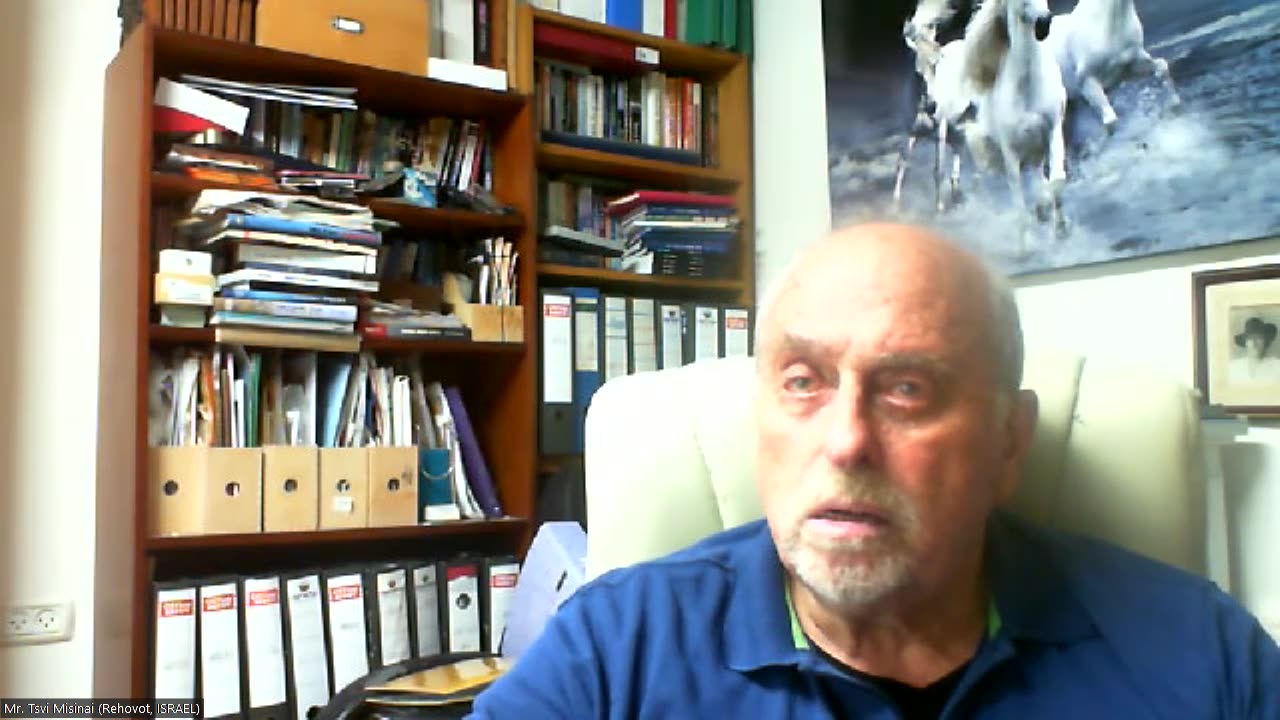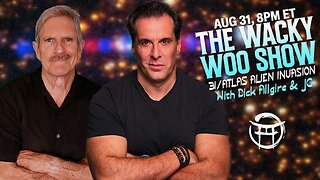Premium Only Content

R&B Monthly Seminar: Jewish Roots Of Land Of Israel "Arabs" ("Palestinians") (Episode #8 -- Monday, October 16th, 2023). Chairman: Mr. Tzvi Misinai (Rehovot, ISRAEL)
R&B Monthly Seminar: Root and Branch Association, Ltd. Fifth Israelite Monarchy Jewish Roots Of Land Of Israel "Arabs" ("Palestinians") Seminar (Episode Eight -- Monday, October 16th, 2023/Eighth Israelite Month, Day 1, 5784). Chairman: Mr. Tzvi Misinai (Rehovot, ISRAEL)
Repeatable Zoom Link for R&B Jewish Roots of Land Of Israel "Arabs" ("Palestinians") Monthly Seminar:
https://us02web.zoom.us/meeting/register/tZYrc-6pqTIuHtLPYdz9XK1UWRHBHs-aQcMC#/registration
Our General Rumble Channel:
https://rumble.com/user/LowellJosephGallin
Our R&B Jewish Roots of Land Of Israel "Arabs" ("Palestinians") Rumble Sub-Channel:
https://rumble.com/c/c-1745117
About R&B Jewish Roots of Land Of Israel "Arabs" ("Palestinians") Monthly Seminar Chairman Mr. Tsvi Misinai:
Founder
The Engagement
https://the-engagement.org/
https://www.youtube.com/@misinai
"Palestinians of Jewish Origin higher resolution"
https://www.youtube.com/watch?v=IQCr7GaVMWA&t=1s
"Jewish signs found among Palestinians (English subtitles)"
https://www.youtube.com/watch?v=StlMl077Ei8
"PALESTINIAN JEWS (Arabic subtitles)"
https://www.youtube.com/watch?v=uAIXdBlUwfU
"The Jewish roots of the Palestinians"
https://www.youtube.com/watch?v=-I55IinfhmU
"Lowell's Show: Tsvi Misinai on the 'Jewish Roots of the Arab Population in the Land of Israel'"
https://www.youtube.com/watch?v=Gs0-RGJ_CFA
https://en.wikipedia.org/wiki/Tsvi_Misinai
Tsvi Misinai
From Wikipedia, the free encyclopedia
Tsvi Misinai
Born Tsvi Jekhorin Misinai
15 April 1946 (age 77)
Jerusalem, British Mandate of Palestine
Occupation Computer scientist, writer, historian
Nationality Israeli
Genre History, Post-Colonialism
Subject Israel, Palestine, Arab–Israeli conflict, Hebrew origins of Palestinians
Website
the-engagement.org
Tsvi Jekhorin Misinai (Hebrew: צבי מסיני; born 15 April 1946) is an Israeli researcher, writer, historian, computer scientist and entrepreneur. A pioneer of the Israeli software industry, he now spends most of his time researching and documenting the common Hebrew roots he believes shared by world Jewry and the Palestinians (including Arab citizens of Israel).
Biography
Misinai (second left from the top row) with friends, during his last year as a B.Sc student at the Haifa Technion in 1968
Tsvi Misinai was born in 1946 in Jerusalem, Mandatory Palestine to Ashkenazi Jewish parents who immigrated from Ternopil in Galicia (now Ukraine) in 1939. He graduated in Physics from the Haifa Technion in 1968. He was the first Israeli to receive the Rothschild Award for industrial development in the field of software in 1992.
Misinai is the founder of Sapiens International Corporation and served as its president until 1994. He embedded the principle of Positive Thinking in computers and invented the Rule Based Object Oriented technology for developing data processing applications, the development of which he started in the Weizmann Institute of Science in 1972.
Misinai self-identifies as a secular Jew and currently resides in Rehovot.
Misinai first heard about the "Hebrew origins of Palestinians" theory from his father, Kha'yim Avraham, who served in the Royal Artillery in the Second World War. His interest was rekindled after the 1991 Gulf War, when there was talk about a new order in the Middle East. After the failure of the Oslo Accords that led to the commencement of the Al-Aqsa Intifada in 2000, he abandoned his career as a Computer scientist and devoted his entire life to investigating the Jewish roots of Palestinians. He now spends his entire time tracking down Palestinians who acknowledge their Jewish heritage, and lobbying ministers, ambassadors, religious leaders and activists in both communities. Misinai, and his team of Arabs and Jews, have embarked on a mission of trying to bring peace to Israel through a unique and controversial project called "The Engagement".
Background
Tsvi Misinai claims that the majority of the Palestinian people—including those with Israeli citizenship or residency, known variously as Arab citizens of Israel, Arab Israelis, Israeli Arabs, including the Bedouin Arabs of Israel—are descendants of the ancient Hebrews, as most of the world's Jewish ethnic divisions are. Furthermore, he claims that at least half of them are quietly aware of this fact.
According to Misinai, unlike the ancestors of the modern day Jews who were city dwellers to a large extent, the Hebrew ancestors of the Palestinians were rural dwellers, and were allowed to remain in the land of Israel to work the land and supply Rome with grain and olive oil.
Misinai states the topic of Hebrew origin was spoken of openly by Palestinians until relatively recent history, much like the Egyptians or Lebanese are aware of their origins in the ancient Egyptians and Phoenicians respectively, even if these ancestral origin topics arouse the passions in those countries among those wishing to either stress or de-emphasise them.
As with other "Arabs" whose local indigenous non-Arab origins became relegated issues over time, the Hebrew origin of Palestinians also became a relegated issue over time. For the Palestinians, however, the additional emergence of Zionism in the early 19th century introduced a quandary complicating an unbiased assessment to either acknowledge or deny the local indigenous non-Arab ancestry of a culturally and linguistically Arabized people.
In the context of the Palestinians, this quandary was a competing national interest in the land they inhabited. Arab nationalism for Palestinians would thus serve as a counter-force vis-à-vis Zionism. The topic of the Palestinians’ ancestral Hebrew origin thus became admonished. Then, the establishment of modern Israel by world Jewry, having transpired to the detriment of the Palestinians, transformed the topic of the Palestinians’ Hebrew origin into a liability in the historical narrative for either side to admit, ultimately becoming the object of outright hostility.
Conversions and Arabization
As a result of remaining in the Land of Israel, the ancestors of the Palestinians partially converted to Christianity during the Byzantine era. Later, with the coming of Islam, they were Islamized through a combination of mainly forced conversions, but also nominal conversions (that is, conversions for form's sake to derive benefits as Muslims, and avoid tributes owed by non-Muslims in Muslim-ruled lands) and others yet out of genuine theological conviction.
Conversion to Islam occurred progressively throughout the successive periods of foreign elite minority rule over Palestine, both on an individual basis and en masse, starting with the conversions during the various dynasties of Arabian Muslim rulers from the initial Muslim conquest of Palestine.
Following these came rule by Muslim non-Arab dynasties such as the Ayyubids (Kurdish Muslim), Mamluks (Turkic Muslim) and finally the Ottomans (Turkish Muslim).
This continuous phase of elite minority foreign Islamic rule over a local indigenous (now largely Muslim) mass was only briefly interrupted by the elite minority foreign Christian rule by the European Crusaders, which lasted from 1099 until their expulsion by the Mameluks in 1291.
Standing before the Sapiens building in Rehovot, Misinai and Ovadia Yerushalmi, a Bedouin Jew and key Engagement Movement activist from the Banu Sawarka tribe
Misinai states that of this gradual process of conversions (often accompanied by Arabization), the majority were forcibly converted during the Fatimid era under the reign of Caliph al-Hakim who was crowned at the age of 11, and reigned from the years 996 to 1021. Due to his young age, in practice, it was his ministers who wielded the actual power behind the throne for some time. They gave the young Caliph power to influence religious matters only, and appointed him as Imam. In 1009, the extremists among his ministers gained the upper hand and brought upon a series of decrees against Christians and Jews.
In 1012, the al-Hakem Edict was issued, under which all Jews and Christians in Palestine were ordered to either convert to Islam or leave. This led to the majority of non-Hebrew origin Christians (i.e., foreign Christians) to leave Palestine, while over 90 per cent of Jews, Samaritans (also of Hebrew origin) and Hebrew-origin Christians converted and became Muslims. They would also become Musta'arabim (Arabized), acculturated into Arab language, custom and culture.
Later, when the edict was finally repealed in 1044 during the reign of Caliph Al-Mustansir of Cairo, only 27 per cent of the Jewish converts to Islam returned to Judaism openly, although they too would remain Musta’arabi (culturally and linguistically Arab).
The remainder continued to live as Muslim crypto-Jews in order to continue enjoying the economic advantages of Muslims, such as exemption from paying jizya and kharaj, the ability to sell their agricultural products to the foreign authorities, or gain employment in the government machinery. Many younger persons of Hebrew-origin (Jewish, Christian or Samaritan) saw it simultaneously possible to lead dual lives, incorporating their prior faith while being outwardly Muslim, and accruing material benefits. Later, with the advent of Mamluk rule, Judaism had reached a breaking point in Palestine.
Backing
In his 1928 anthropological work, Arabs in Eretz Israel, Israel Belkind, a pioneer of the First Aliyah, advanced the claim that the Palestinian Arabs were descended from the ancient Hebrews.[12]
Tsvi Misinai validates his theory of the Hebrew origin of Palestinians on the basis of various findings in terms of historic-demographic, historic-geographic, national-territorial, genetic, behavioural-religious, nomenclature and linguistics, and Palestinian cultural and oral traditions.
In his book Brother shall not lift sword against brother, he details numerous testimonies of their Jewish ancestry by Palestinians and Bedouins, and cites the anthropological studies conducted by Israel Belkind, one of the organizers of the Bilu movement, David Ben-Gurion and Yitzhak Ben-Zvi (both the first Prime Minister and the second President of Israel, respectively).
Misinai also cites the following three genetic studies as lending credence to his theory. Among the genetic studies referred to by him include recent genetic studies conducted by Professor Ariella Oppenheim of the Hebrew University in Jerusalem on the male Y chromosome which revealed that the present day Jews and Palestinians represent modern descendants of a core population that lived in the area now constituting the state of Israel and the Palestinian territories, since prehistoric times.
In 2001, the Human Immunology magazine published a genetic study conducted by Prof. Antonio Arnez-Vilna, a Spanish researcher from the Complutense University of Madrid, who discovered that the immune systems of the Jews and the Palestinians are extremely close to one another in a way that almost absolutely demonstrates a similar genetic identity.
Furthermore, a 2002 test by Tel Aviv University researchers, determined that only two groups in the world—Ashkenazi Jews and Palestinians—were genetically susceptible to an inherited deafness syndrome.
Classification of the Palestinians
Tsvi Misinai separates the Palestinian people into three main groups; the "Descendants of Israel", "Brethren of Israel" and "Palestinians of miscellaneous origins". He states that until recently, there had been very few inter-marriages between these groups, as Palestinians usually tended to marry within their own clans or related clans.
Descendants of Israel
The "Descendants of Israel", he claims, comprise descendants of the ancient biblical Hebrews which are native to the land west of the Jordan River (the West Bank, Gaza Strip and Israel proper). They are more specifically descended from the inhabitants of the Kingdom of Judah, as opposed to the Samaritans who are mainly descended from the inhabitants of the Kingdom of Israel.
Misinai claims that the Descendants of Israel had ceased to call themselves Musta’arbim, when the Brethren of Israel returned to their homeland during the 18th and 19th centuries. Despite this, stories about the Jewish origins of the family were passed on among the Descendants of Israel, and a few Jewish customs were preserved. Both groups began seeing themselves as one people, although endogamous marriages with their own clans ensured the purity of their blood lines until very recently.
PLEASE READ LOWELL'S NEW FIRST BOOK: "Cracking the Qur'an Code: God's Land, Torah and People Covenants with Israel in the Qur'an and Islamic Tradition" (2011 Second Edition)
SEVEN PILLARS OF BIBLE BASED MESSIANIC GOOD GOVERNMENT OF THE EMERGING FIFTH ISRAELITE MONARCHY OF DANIEL'S VISION NOW BEING RESTORED IN JERUSALEM, ISRAEL (Daniel 2:44)
https://www.academia.edu/97397071/SEVEN_PILLARS_OF_BIBLE_BASED_MESSIANIC_GOOD_GOVERNMENT_OF_EMERGING_FIFTH_ISRAELITE_MONARCHY_OF_DANIELS_VISION_NOW_BEING_RESTORED_IN_JERUSALEM_ISRAEL_Daniel_2_44_
Thus Says The God Of Israel/Yeshayahu-Isaiah 19:18-25
https://mechon-mamre.org/p/pt/pt1019.htm
יח בַּיּוֹם הַהוּא יִהְיוּ חָמֵשׁ עָרִים בְּאֶרֶץ מִצְרַיִם, מְדַבְּרוֹת שְׂפַת כְּנַעַן, וְנִשְׁבָּעוֹת, לַיהוָה צְבָאוֹת: עִיר הַהֶרֶס, יֵאָמֵר לְאֶחָת. {ס} 18 In that day there shall be five cities in the land of Egypt that speak the language of Canaan, and swear to the LORD of hosts; one shall be called the city of destruction.
יט בַּיּוֹם הַהוּא, יִהְיֶה מִזְבֵּחַ לַיהוָה, בְּתוֹךְ, אֶרֶץ מִצְרָיִם; וּמַצֵּבָה אֵצֶל-גְּבוּלָהּ, לַיהוָה. 19 In that day shall there be an altar to the LORD in the midst of the land of Egypt, and a pillar at the border thereof to the LORD.
כ וְהָיָה לְאוֹת וּלְעֵד לַיהוָה צְבָאוֹת, בְּאֶרֶץ מִצְרָיִם: כִּי-יִצְעֲקוּ אֶל-יְהוָה מִפְּנֵי לֹחֲצִים, וְיִשְׁלַח לָהֶם מוֹשִׁיעַ וָרָב וְהִצִּילָם. 20 And it shall be for a sign and for a witness unto the LORD of hosts in the land of Egypt; for they shall cry unto the LORD because of the oppressors, and He will send them a saviour, and a defender, who will deliver them.
כא וְנוֹדַע יְהוָה לְמִצְרַיִם, וְיָדְעוּ מִצְרַיִם אֶת-יְהוָה בַּיּוֹם הַהוּא; וְעָבְדוּ זֶבַח וּמִנְחָה, וְנָדְרוּ-נֵדֶר לַיהוָה וְשִׁלֵּמוּ. 21 And the LORD shall make Himself known to Egypt, and the Egyptians shall know the LORD in that day; yea, they shall worship with sacrifice and offering, and shall vow a vow unto the LORD, and shall perform it.
כב וְנָגַף יְהוָה אֶת-מִצְרַיִם, נָגֹף וְרָפוֹא; וְשָׁבוּ, עַד-יְהוָה, וְנֶעְתַּר לָהֶם, וּרְפָאָם. {ס} 22 And the LORD will smite Egypt, smiting and healing; and they shall return unto the LORD, and He will be entreated of them, and will heal them.
כג בַּיּוֹם הַהוּא, תִּהְיֶה מְסִלָּה מִמִּצְרַיִם אַשּׁוּרָה, וּבָא-אַשּׁוּר בְּמִצְרַיִם, וּמִצְרַיִם בְּאַשּׁוּר; וְעָבְדוּ מִצְרַיִם, אֶת-אַשּׁוּר. {ס} 23 In that day shall there be a highway out of Egypt to Assyria, and the Assyrian shall come into Egypt, and the Egyptian into Assyria; and the Egyptians shall worship with the Assyrians.
כד בַּיּוֹם הַהוּא, יִהְיֶה יִשְׂרָאֵל שְׁלִישִׁיָּה, לְמִצְרַיִם, וּלְאַשּׁוּר: בְּרָכָה, בְּקֶרֶב הָאָרֶץ. 24 In that day shall Israel be the third with Egypt and with Assyria, a blessing in the midst of the earth;
כה אֲשֶׁר בֵּרְכוֹ יְהוָה צְבָאוֹת, לֵאמֹר: בָּרוּךְ עַמִּי מִצְרַיִם, וּמַעֲשֵׂה יָדַי אַשּׁוּר, וְנַחֲלָתִי, יִשְׂרָאֵל. {ס} 25 for that the LORD of hosts hath blessed him, saying: 'Blessed be Egypt My people and Assyria the work of My hands, and Israel Mine inheritance.'
-
 2:25:11
2:25:11
TheSaltyCracker
5 hours agoTrump Is Not Dead ReEEeStream 8-31-25
70.9K101 -
 3:09:16
3:09:16
THOUGHTCAST With Jeff D.
3 hours ago $0.67 earnedLabor Day Weekend FORTNITE With THOUGHTCAST Jeff & the squad
11.7K4 -
 3:44:05
3:44:05
Rallied
6 hours ago $4.00 earnedSolo Challenges All Day
40.5K1 -
 LIVE
LIVE
iCheapshot
6 hours ago $0.20 earnedCall of Duty: Black Ops Campaign
40 watching -
 4:39:16
4:39:16
Meisters of Madness
7 hours agoMadness in a Pod
7.59K1 -
 1:25:44
1:25:44
HELMETFIRE
3 hours ago🟢GAMING WITH FIRE EP9🟢
7.91K -
 1:24:08
1:24:08
Jean-Claude@BeyondMystic
15 hours ago🌀 THE WACKY WOO SHOW 3I ATLAS ALIEN INVASION with DICK ALLGIRE & JC - AUG 31 , 20254
47.4K62 -
 2:26:21
2:26:21
vivafrei
14 hours agoEp. 279: Patel's GF Sues for Defamation! Rogue Judges vs. Trump! Raja Jackson, Kick Stream & MORE!
143K81 -
 18:52
18:52
Colion Noir
11 hours agoCourt Rules You Don't Need AR-15s For Self Defense, Mayor's Message If You Love Kids Ban AR-15s
30.2K91 -
 1:56:25
1:56:25
Nerdrotic
7 hours ago $8.82 earnedThe Mysteries of Mars and the Moon with Mike Bara | Forbidden Frontier #114
32.5K9